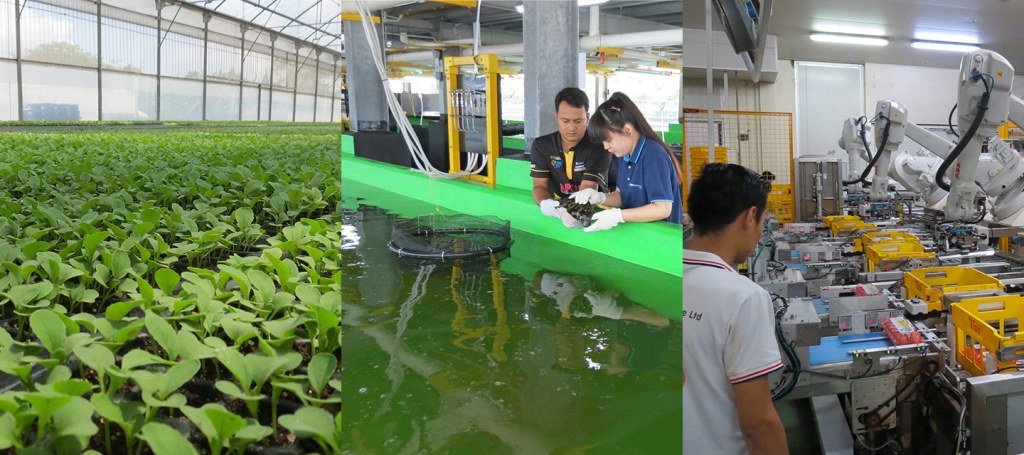Transforming Urban Landscapes: Explore Lucrative Urban Farming Jobs In Singapore
Urban Farming Jobs in Singapore
Greetings, Readers! Today, we will explore the exciting world of urban farming jobs in Singapore. As the city-state continues to prioritize sustainable living and food security, the demand for skilled individuals in the urban farming industry has skyrocketed. In this article, we will delve into the what, who, when, where, why, and how of urban farming jobs, along with their advantages, disadvantages, frequently asked questions, and a call to action. So, let’s dive in!
The Basics: What Are Urban Farming Jobs?
Urban farming jobs refer to employment opportunities in the field of urban agriculture, where individuals contribute to the cultivation of crops, raising of livestock, and production of food in urban areas. These jobs involve utilizing various techniques such as hydroponics, aeroponics, and vertical farming to maximize limited space and resources in cities like Singapore.
1 Picture Gallery: Transforming Urban Landscapes: Explore Lucrative Urban Farming Jobs In Singapore

1. Hydroponics
Hydroponics is a method of growing plants without soil, using mineral nutrient solutions in water. In urban farming jobs, hydroponics is often employed to enhance food production in limited spaces, as it allows crops to grow faster and requires less water compared to traditional soil-based farming.
2. Aeroponics
Aeroponics is a technique that involves growing plants in an air or mist environment without the use of soil or aggregate medium. This method allows for precise control over nutrient delivery and promotes efficient water usage. Urban farming jobs utilizing aeroponics are gaining popularity due to their ability to produce high-quality crops with minimal resources.
3. Vertical Farming
Vertical farming involves growing crops in vertically stacked layers, utilizing artificial lighting and controlled environments. This technique maximizes the use of vertical space in urban areas, making it an ideal solution for cities like Singapore with limited land availability. Vertical farming not only increases food production but also reduces transportation costs and the carbon footprint associated with traditional agriculture.
Who Are the Key Players in Urban Farming Jobs?

Image Source: safef.org.sg
Urban farming jobs attract a diverse range of individuals passionate about sustainable agriculture, urban planning, and environmental conservation. These jobs are suitable for farmers, horticulturists, researchers, agricultural engineers, urban planners, educators, and even entrepreneurs. Regardless of their background, urban farming professionals share a common goal of contributing to a greener and more self-sufficient urban landscape in Singapore.
1. Farmers and Horticulturists
Farmers and horticulturists play a crucial role in urban farming jobs as they are responsible for the day-to-day operations of growing and maintaining crops. Their expertise in plant care, pest control, and harvesting ensures a successful urban farming venture.
2. Researchers
Researchers in urban farming jobs focus on developing innovative methods to improve crop yields, increase resource efficiency, and enhance overall sustainability. They conduct experiments, analyze data, and collaborate with other professionals to advance the field of urban agriculture.
3. Agricultural Engineers
Agricultural engineers in urban farming jobs design and implement systems that optimize agricultural processes in urban environments. They develop irrigation systems, lighting solutions, and automation technologies to improve crop production and reduce resource consumption.
When and Where are Urban Farming Jobs Available in Singapore?
Urban farming jobs are available year-round in Singapore due to the city-state’s commitment to sustainable food production. These jobs can be found in various settings, such as rooftop gardens, vertical farms, community gardens, educational institutions, research facilities, and even corporate offices. The increasing number of urban farming startups and government initiatives further contribute to the availability of job opportunities in this field.
1. Rooftop Gardens
Rooftop gardens are a popular location for urban farming jobs in Singapore. These green spaces provide an ideal environment for growing crops and offer additional benefits such as insulation, rainwater harvesting, and urban heat island mitigation.
2. Vertical Farms
Vertical farms, equipped with advanced technologies, are another key location for urban farming jobs. These multi-layered cultivation systems maximize land use in urban areas and are capable of producing a significant amount of fresh produce.
3. Community Gardens
Community gardens play a vital role in urban farming jobs as they provide opportunities for individuals to come together and grow their food. These gardens foster a sense of community, promote sustainable practices, and educate people about the benefits of urban agriculture.
Why Are Urban Farming Jobs Important?
Urban farming jobs play a crucial role in addressing several pressing issues faced by cities like Singapore. Here are some reasons why these jobs are important:
1. Food Security
Urban farming jobs contribute to food security by reducing the reliance on imported produce. By growing food locally, cities can ensure a steady supply of fresh and nutritious produce, even in times of global crises or disruptions in the food supply chain.
2. Environmental Sustainability
Urban farming jobs promote environmental sustainability by reducing the carbon footprint associated with long-distance food transportation. They also minimize the use of harmful pesticides and herbicides, leading to healthier ecosystems and cleaner air and water.
3. Economic Opportunities
Urban farming jobs create economic opportunities by generating employment and supporting local businesses. As the demand for sustainably produced food increases, so does the need for skilled professionals in the urban farming industry.
How Can You Pursue a Career in Urban Farming Jobs?
If you are interested in pursuing a career in urban farming, here are some steps you can take:
1. Gain Relevant Knowledge and Skills
Acquire knowledge in areas such as agriculture, horticulture, hydroponics, and sustainable farming practices. Explore courses, workshops, and certifications to enhance your skills and understanding of urban farming.
2. Seek Hands-on Experience
Internships, volunteering, or working part-time on urban farms or community gardens can provide valuable hands-on experience and insights into the industry. This practical experience will make you more marketable to potential employers.
3. Network and Collaborate
Engage with professionals in the urban farming industry by attending conferences, seminars, and networking events. Collaborate with like-minded individuals to learn from their experiences and gain exposure to different aspects of urban farming.
Advantages and Disadvantages of Urban Farming Jobs
Advantages:
1. Increased food security and self-sufficiency
2. Reduced environmental impact
3. Creation of green spaces in urban areas
4. Employment opportunities and economic growth
5. Promotion of healthier and more sustainable lifestyles
Disadvantages:
1. Limited space and resources in urban areas
2. High initial investment in urban farming infrastructure
3. Dependence on technology and automation
4. Potential challenges in obtaining permits and regulations
5. Need for ongoing research and innovation
Frequently Asked Questions
1. Can I practice urban farming in my own backyard?
Yes, you can practice urban farming in your own backyard as long as you comply with local regulations and consider factors such as space, sunlight, and soil quality.
2. Do urban farmers use pesticides?
Urban farmers prioritize organic and sustainable farming practices, which minimize the use of pesticides. Integrated Pest Management techniques are commonly employed to control pests without relying on harmful chemicals.
3. Are urban farming jobs financially viable?
While urban farming jobs can be financially viable, it depends on various factors such as market demand, crop selection, and efficient resource management. Proper planning and business strategies are essential for long-term success.
4. How can urban farming contribute to climate change mitigation?
Urban farming reduces greenhouse gas emissions by minimizing the distance food travels, reducing food waste, and sequestering carbon through plant growth. It also helps combat the urban heat island effect by creating green spaces.
5. Can urban farming be practiced in high-rise buildings?
Yes, urban farming can be practiced in high-rise buildings using vertical farming techniques. These systems allow for the efficient use of space and resources, making it possible to grow crops even in urban areas with limited ground space.
Conclusion
In conclusion, urban farming jobs in Singapore offer exciting career opportunities for individuals passionate about sustainable agriculture and food security. These jobs contribute to the development of innovative farming techniques, promote environmental sustainability, and enhance local food production. By pursuing a career in urban farming, you can make a positive impact on Singapore’s urban landscape, nourish communities with fresh produce, and be a part of the growing movement towards a greener future.
Final Remarks
Friends, as we conclude this article, let us remember that urban farming jobs are not just about growing food; they are about creating a more sustainable and resilient future. By supporting local urban farming initiatives and pursuing careers in this field, we can collectively work towards a greener and healthier Singapore. Let us embrace the possibilities of urban farming and be the change we wish to see. Together, we can transform our concrete jungles into thriving urban agrihoods. Happy farming!
This post topic: Gardens


